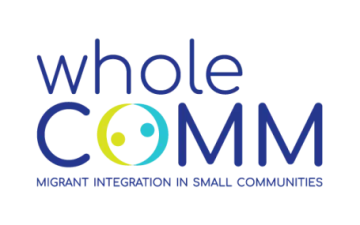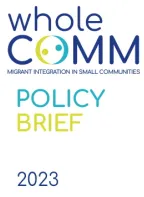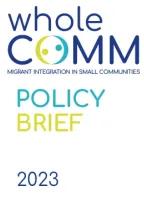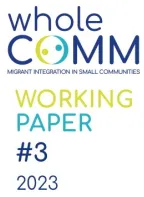Whole-COMM
Exploring the Integration of Post-2014 Migrants in Small and Medium-sized Towns and Rural Areas from a Whole of Community Perspective
In recent years, the EU has received an unprecedented number of migrants and asylum seekers, often in a disordered way. This has led to a growing presence of immigrants in small and medium-sized cities and rural areas

How these local communities respond to this challenge will profoundly shape the future of integration into Europe. Whole-COMM proposes to address these problems through an innovative research approach that conceives the integration of migrants as a community-building process characterized by: (a) taking place in local contexts with certain structural constraints; b) being the result of interactions between multiple actors from different levels and locations; and c) having an open ending that can lead to more cohesive or fragmented social relationships. The focus of the project on small and medium-sized cities and rural areas thus allows to contribute to filling a gap in research and political debates beyond large cities.
Whole-COMM promotes scientific knowledge about the dynamics and causal mechanisms that influence the complex relationship between integration policies and Community cohesion. This is through a comparative approach between countries (8 EU and 2 non-EU) and between localities (40), and a mixed methodology that combines qualitative and quasi-experimental techniques, an attitude survey and a quantitative analysis on the impact of policies on social cohesion and immigrant integration trajectories. At the policy level, Whole-COMM aims to encourage debate through the production of new comparative knowledge and interaction with a variety of actors in a policy learning and co-creating process. This is in order to drive innovation in small and medium-sized cities and rural areas, and to build more cohesive and resilient communities towards change.
This project has received funding from the European Union’s Horizon 2020 research and innovation programme under grant agreement No 101004714

Partners:
- Barcelona Centre for International Affairs (CIDOB)
- Collegio Carlo Alberto
- Universität für Weiterbildung Krems
- Vrije Universiteit Brussel
- Technische Universtiät Chemnitz
- European University Institute
- Uniwersytet Wroclawski
- Erasmus Universiteit Rotterdam
- Malmö Universitet
- Migraition Policy Group
- Sabanci Üniversitesi
- York University
Researchers involved in the project:
- Juan Ramón Jiménez-García
- Reinhard Schweitzer





